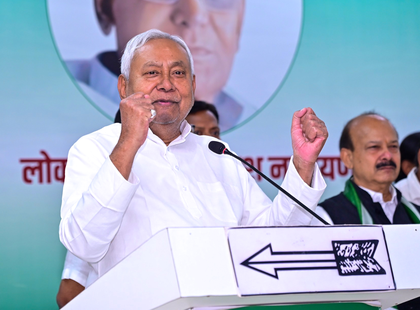Emergency, a symbol of dictatorship: CM Nitish Kumar
By IANS | Updated: June 25, 2025 14:33 IST2025-06-25T14:28:36+5:302025-06-25T14:33:50+5:30
Patna, June 25 As the NDA government marks June 25 as 'Black Day' in remembrance of the 1975 ...

Emergency, a symbol of dictatorship: CM Nitish Kumar
Patna, June 25 As the NDA government marks June 25 as 'Black Day' in remembrance of the 1975 Emergency, Bihar Chief Minister Nitish Kumar joined the chorus of criticism against the Congress regime of that time, terming the imposition of Emergency as a "symbol of dictatorship" and a dark chapter in Independent India’s history.
In a post shared on his official X handle, CM Kumar recalled the events of June 25, 1975, when then Prime Minister Indira Gandhi declared a nationwide Emergency, curbing civil liberties, censoring the press, and jailing opposition leaders.
“We all remember that day of 25 June 1975, when an Emergency was imposed in the country. It is called a Black Day in the history of independent India. The Emergency of 1975 was a symbol of the dictatorship of the then-government. In the Emergency, the freedom of expression of the people was banned,” he wrote.
The Bihar CM further reminisced about the resistance led by Loknayak Jayaprakash Narayan, who spearheaded the 'Sampoorn Kranti (Total Revolution)' movement.
Kumar stated that he himself participated in the movement and was jailed along with many colleagues for raising their voices against the authoritarian regime.
“Loknayak Jayaprakash Narayan started a movement against the Emergency. I also participated in this movement along with many of my colleagues and actively opposed the Emergency. All of us were jailed for raising our voices against the dictatorship. But the countrymen showed unity and courage. We fought unitedly,” he added.
Reiterating the importance of democratic values, CM Kumar emphasised the role of Bihar in upholding constitutional principles and social justice.
“The voice of the people is at the core of democracy. It is our responsibility to protect it in every situation. Bihar has always made the spirit of Constitution, justice, freedom, and social justice the path of its development,” he said.
The Emergency was declared on June 25, 1975, under Article 352 of the Indian Constitution, citing internal disturbances.
It lasted 21 months and was lifted in March 1977. During this period, fundamental rights were suspended, the press was muzzled, and thousands of opposition leaders and activists were jailed across the country.
In Bihar, the Emergency ignited a mass movement under Jayaprakash Narayan, a native of Sitab Diara in the Saran district, which played a key role in mobilising public opinion and eventually led to the fall of the Congress government in 1977.
Disclaimer: This post has been auto-published from an agency feed without any modifications to the text and has not been reviewed by an editor
Open in app